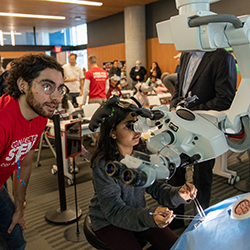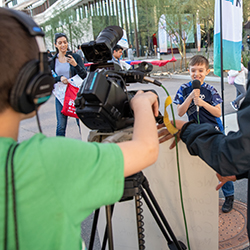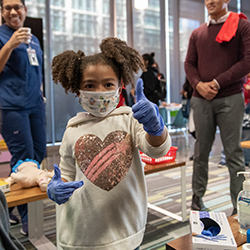Mysteries of Science Unlocked at 6th Annual STEM Event
The University of Arizona College of Medicine – Phoenix campus transformed into a gigantic science lab Saturday as more than 9,000 children and parents tried their hand at robotic surgery, dissected pig hearts, tested the aerodynamics of baseballs, made slime and gurgling foam, extracted DNA from a strawberry and flew a simulated drone.
These exhibits were among the more than 100 hands-on activities offered at Connect2STEM, an annual outreach event meant to inspire kids about science, technology, engineering, math and medicine. It was the sixth year for the free event, which is organized by the University of Arizona College of Medicine – Phoenix in partnership with Cox Communications and the Arizona SciTech Institute.

Kids and adults crowded into BrainWorks Lab, where they watched actual brain surgery through virtual reality goggles. Steady hands were tested on an operating microscope where attendees used a strand smaller than a human hair to thread a needle. This was the debut of BrainWorks Lab, powered by Banner Health and the College of Medicine – Phoenix.
BrainWorks was spearheaded by Peter Nakaji, MD, chair of the Department of Neurosurgery at Banner – University Medical Center and physician executive of Neurosurgery at Banner Health. He attended last year’s Connect2STEM with his own children.
“It’s more fun for me this year because I am able to bring some of the most exciting and cutting-edge things we are doing at Banner, but make it totally accessible to these children,” Dr. Nakaji said. “They don’t feel like this is over their head. They feel like they want to be in someone’s head and doing this. That’s what we want.”
Jennie Logan brought her nine-year-old daughter and a friend to the event and said the girls were having a great time, so much so that she couldn’t get them to move on from a booth where they used colorful modeling clay to affix organs on a skeleton.
Arizona State Senator Heather Carter, EdD, assistant professor of practice in the Mel and Enid Zuckerman College of Public Health at the University of Arizona, who spoke during the opening ceremony, said now is the time to capture young people’s interest in science, technology, engineering, math and medicine because “Who knows? That person who might cure cancer one day might be in our midst today.”
Rose Carlson attended with her three- and five-year-old grandchildren. She said what made Connect2STEM different from other events is that the kids could touch, feel and actually participate. “The interaction is invaluable,” she said. “Hopefully it will spark an interest in STEM.”

The College of Medicine – Phoenix showcase exhibit was a vast simulation room where children learned from medical students how to intubate a realistic, high-fidelity mannequin, take vitals, perform ultrasounds, perfect their CPR technique and practice surgery skills with the da Vinci surgical robot. Kids gathered around cow eye and pig hearts where medical students explained the organs’ anatomy and function. At the Wildcat Play Hospital, little ones gave their stuffed animals checkups with help from UA College of Nursing students and faculty.
Other University of Arizona divisions and departments on hand were the College of Pharmacy, Department of Planetary Sciences, College of Architecture’s Planning and Landscape Architecture, Cooperative Extension, Mel and Enid Zuckerman College of Public Health’s Student Alliance, Police Department, East Valley Cats, Eller College of Management, Field Crops Insect Management, Flandrau Science Center and Planetarium, Health Sciences Library, Lowell Institute for Mineral Resources, U of A Health Sciences, School of Information, Office of Undergraduate Admissions/Early Academic Outreach, Cancer Center and Graduate Women in Science Arizona chapter.
The daylong event featured exhibitors from all three of the state’s universities, including the Northern Arizona University Physical and Occupational Therapy programs and Arizona State University’s Graduate Association of Interdisciplinary Neuroscience Students.

Professionals from businesses and local community organizations also took part, including Phoenix Children’s Hospital, the National Weather Service, the U.S. Army, Intel Corp., Arizona Diamondbacks, Children’s Museum of Phoenix, Arizona Science Center, Phoenix Herpetological Society, American Society for Microbiology and the American Industrial Hygiene Association. Several local high schools were represented with their robotics teams.
Sponsors were Banner Health, USAA, Radiall, Arizona Public Service Co., City of Phoenix Public Works Department, Southwest Airlines, Sundt | DPR, Boyer Company, Standard Parking and Fry’s Food Stores.
Connect2STEM is the kickoff for the Arizona SciTech Festival, a two-month campaign in February and March that promotes science events across the state. During the opening ceremony Abbey Schroeder from U.S. Senator Martha McSally’s staff, gave special recognition to Jeremy Babendure, executive director of the SciTech Institute, for leading efforts to raise awareness, make connections and empower youngsters about STEM education.
Roxanne Wingate, senior community relations specialist for Cox Communications, said the technology company is proud to partner with the University of Arizona.
“We know that the youth attending today’s event are our future innovators and the next generation of STEM leaders,” she said.
Photos and Video
About the College
Founded in 2007, the University of Arizona College of Medicine – Phoenix inspires and trains exemplary physicians, scientists and leaders to advance its core missions in education, research, clinical care and service to communities across Arizona. The college’s strength lies in our collaborations and partnerships with clinical affiliates, community organizations and industry sponsors. With our primary affiliate, Banner Health, we are recognized as the premier academic medical center in Phoenix. As an anchor institution of the Phoenix Bioscience Core, the college is home to signature research programs in neurosciences, cardiopulmonary diseases, immunology, informatics and metabolism. These focus areas uniquely position us to drive biomedical research and bolster economic development in the region.
As an urban institution with strong roots in rural and tribal health, the college has graduated more than 1,000 physicians and matriculates 130 students each year. Greater than 60% of matriculating students are from Arizona and many continue training at our GME sponsored residency programs, ultimately pursuing local academic and community-based opportunities. While our traditional four-year program continues to thrive, we will launch our recently approved accelerated three-year medical student curriculum with exclusive focus on primary care. This program is designed to further enhance workforce retention needs across Arizona.
The college has embarked on our strategic plan for 2025 to 2030. Learn more.